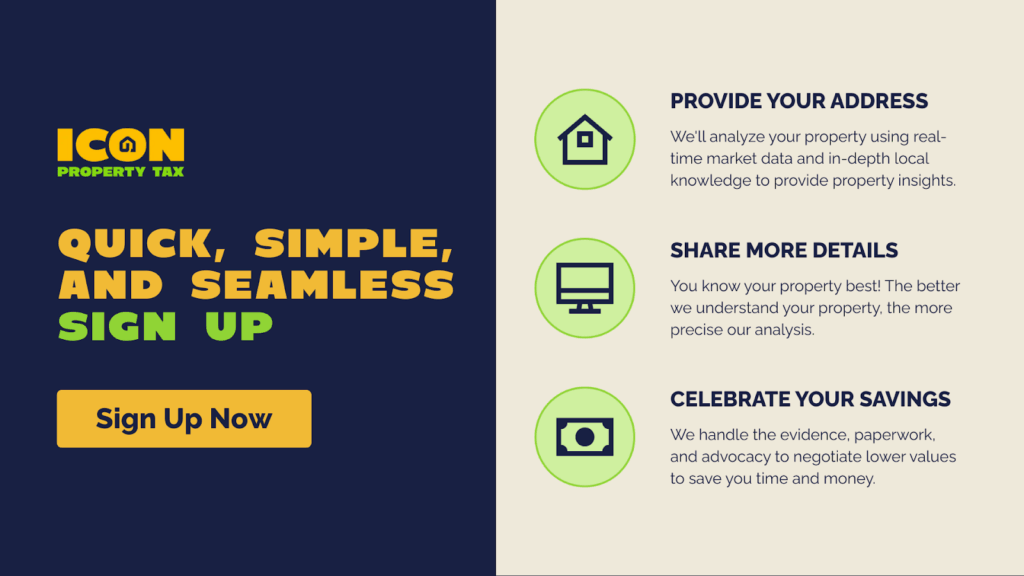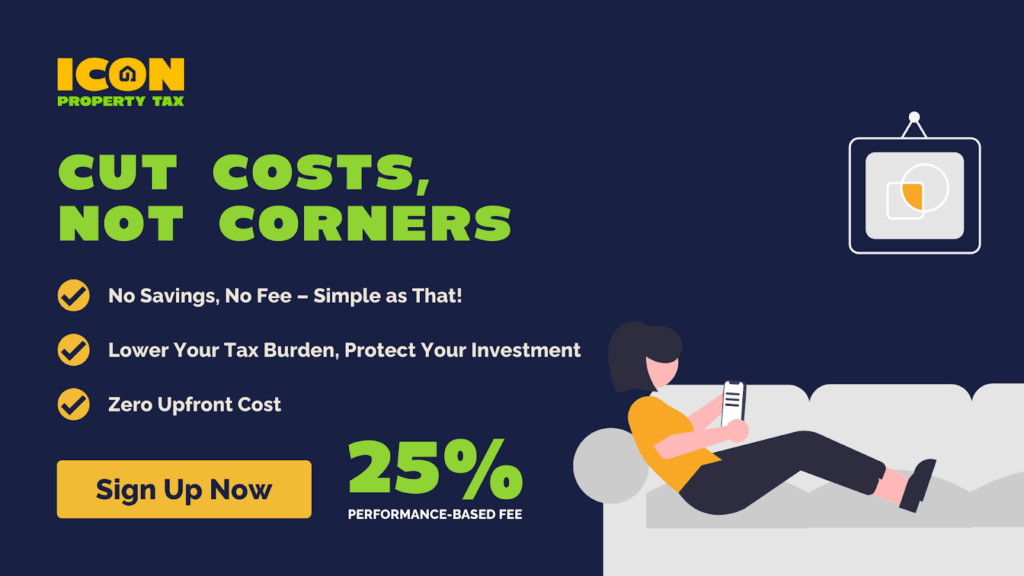How Much Do Property Taxes In Florida Run On Average?
August 27, 2025
Key Takeaways:
- Florida’s Competitive Tax Rate: Florida’s average property tax rate is approximately 0.80%, placing it below the national average and making it attractive for homeowners and investors.
- Local Rates & Exemptions Matter: Millage rates and exemptions like the Homestead Exemption significantly influence your final property tax bill, depending on the county you live in.
- Professional Tax Appeal Support: Experts like Icon Property Tax can assist in lowering your tax liability through strategic appeals and valuation reviews.
Our team of professionals has successfully helped property owners across Florida and the nation save millions of dollars in property taxes by challenging over-assessments, managing complicated exemptions, and advocating for fair valuations. With decades of combined experience and a client-first approach, our team understands how to turn confusion and frustration into clarity and real savings.
Property taxes are one of the largest recurring expenses homeowners and real estate investors face. In Florida, they can feel deceptively simple—until your bill arrives and raises questions about how it was calculated, why it increased, or what you can do about it. Between exemptions, county-level variations, and annual reassessments, understanding how much property tax you’ll actually owe in Florida is more involved than it seems.
In this piece, we’ll be breaking down how much property taxes in Florida run on average, what factors influence them, and what you can do to reduce your liability.
What Are Property Taxes?
Property taxes are annual fees paid by property owners to local governments, typically based on the assessed value of their real estate. These taxes are a major source of revenue for municipalities and counties, helping fund integral public services such as:
- Public schools
- Police and fire departments
- Road maintenance
- Parks and recreational services
- Local government operations
Every homeowner, whether they live in a house, condo, or own land, is subject to property taxes. These taxes make certain that communities have the resources to function effectively and maintain a high quality of life.
In Florida, property taxes are collected at the county level, and rates can vary depending on where the property is located, its value, and any exemptions that may apply (like homestead exemptions for primary residences).
How Are Property Taxes Calculated In Florida?
Understanding how property taxes are calculated is key to estimating your yearly expenses as a Florida homeowner. The amount you owe depends on your property’s assessed value and the local millage rate. Here’s a breakdown of the main components:
Assessed Value
The assessed value is the estimated market value of your property, determined each year by your county’s property appraiser. It can be reduced by exemptions like the Homestead Exemption, which lowers the taxable portion of your home’s value if it’s your primary residence.
Millage Rate
The millage rate is the amount of tax per $1,000 of taxable property value, set by your local government and taxing districts. These rates vary across counties and cities, directly affecting the total amount you owe.
Calculation Example
Suppose your home is valued at $300,000 and you receive a $50,000 homestead exemption. If the millage rate is 18, your taxable value would be $250,000, leading to an annual property tax bill of $4,500.

What Is The Average Property Tax Rate In Florida?
Florida offers a relatively moderate property tax burden compared to many other states. While exact rates vary by location, homeowners benefit from statewide policies like the Homestead Exemption, which helps keep taxes manageable. Here’s what you need to know:
Statewide Average Rate
As of recent data, the average property tax rate in Florida is around 0.80% of a property’s assessed value. This places Florida below the national average, which is typically closer to 1.00% to 1.10%.
Typical Annual Costs
For a home valued at $300,000, a homeowner in Florida can expect to pay roughly $2,400 per year in property taxes, assuming the average rate and applicable exemptions. This figure can vary significantly depending on the county and local taxing districts.
Factors That Influence Rates
Local budgets, school funding needs, and municipal services can all influence the millage rate in your area. Areas with higher public service demands may have slightly elevated tax rates to support those services.
Florida Vs. National Average: How Do They Compare?
If you’re considering a move or investment in Florida, it’s helpful to understand how the state’s property taxes stack up nationally. Florida is often seen as tax-friendly, and its property taxes are no exception. Let’s look at how it compares:
Lower Than Many Other States
Florida’s average effective property tax rate of 0.80% is lower than the national average, which typically hovers around 1.10%. States like New Jersey, Illinois, and Texas have rates exceeding 2.00%, making Florida a more affordable option in terms of yearly tax obligations.
No State Income Tax Advantage
One of Florida’s biggest draws is that it doesn’t have a state income tax, making the overall tax burden lower for many residents. This combination of no income tax and moderate property taxes can make Florida especially attractive to retirees and investors.
Ideal For Long-Term Homeowners
Thanks to laws like the Save Our Homes cap, annual increases in assessed value for primary residences are limited to 3% or less. This protects long-term homeowners from sharp spikes in property taxes, helping them plan for predictable costs.
County-by-County Property Tax Variations
While Florida’s average property tax rate is relatively low, actual costs can vary significantly depending on the county. This is because each local government sets its own millage rate and budget needs. Here’s how it breaks down:
Highest Property Tax Counties
Counties like Palm Beach, Broward, and Miami-Dade often have higher effective tax rates, usually due to dense populations and increased demand for public services. In these areas, rates can approach or exceed 1.00%, depending on exemptions and millage changes.
Lowest Property Tax Counties
On the other end, counties such as Walton, Jackson, and Holmes tend to have some of the lowest rates in the state. These rural or less densely populated areas may see effective tax rates below 0.60%.
Why These Differences Matter
Understanding county variations is imperative when buying property in Florida. For real estate investors or homeowners working with property tax consultants like Icon, location-specific knowledge can help minimize tax exposure and maximize savings.

How To Lower Your Property Tax Bill In Florida
Even though Florida has modest property taxes, there are still several ways to reduce what you owe. By taking advantage of exemptions and appealing assessments, homeowners can significantly lower their tax burden. Here’s how to do it:
Apply For The Homestead Exemption
Florida residents who own and occupy their home as their primary residence can apply for a Homestead Exemption of up to $50,000. This exemption not only lowers the taxable value but also triggers the Save Our Homes cap, limiting annual assessment increases.
Explore Additional Exemptions
Additional exemptions may be available for seniors, disabled persons, veterans, and surviving spouses. These can provide hundreds to thousands of dollars in annual savings, depending on eligibility.
Challenge Your Property Assessment
If you believe your property has been over-assessed, you have the right to file an appeal with your county’s Value Adjustment Board. Working with professionals like Icon can increase your chances of a successful reduction, as they specialize in property tax appeals across Florida.
When And How To Pay Your Florida Property Taxes
Florida property taxes are paid annually, and timing your payment correctly can save you money. Understanding the schedule and payment methods can help you avoid penalties and even earn discounts. Here’s what to know:
Annual Payment Schedule
Property tax bills are typically mailed out in November, and payment is due by March 31st of the following year. Paying early can qualify you for a discount, up to 4% if paid in November.
Payment Methods
Most Florida counties allow you to pay your property taxes online, by mail, or in person at the tax collector’s office. Online portals are commonly used and provide a convenient way to track and manage your payment.
Avoiding Penalties
If you miss the March 31st deadline, penalties and interest begin to accrue starting April 1st. Continued non-payment can lead to tax certificates being sold at auction, which may result in the loss of the property.
Get Professional Help With Property Tax Appeals
Managing the property tax system can be overwhelming, especially if you believe your assessment is too high. Thankfully, some professionals specialize in helping homeowners and investors appeal their property taxes successfully. Here’s why that matters:
Why Appeal Your Assessment
If your home’s assessed value is higher than its true market value, you could be paying more in taxes than necessary. Appealing the assessment can lead to substantial annual savings, especially over the long term.
The Value Of Professional Help
Filing an appeal requires documentation, deadlines, and sometimes a formal hearing. Firms like Icon are experienced in managing this process and have a strong track record of reducing property tax bills for Florida property owners.
Ideal For Homeowners And Investors
Whether you own a single-family home or manage multiple investment properties, professional consultants can make sure that you’re not overpaying. Professional help is especially useful in counties with frequent reassessments or complicated property valuations.

Final Thoughts
Property taxes in Florida are relatively affordable compared to many other states, making the Sunshine State an appealing destination for homeowners and real estate investors alike. However, your exact tax bill depends on several factors, including your property’s location, assessed value, available exemptions, and local millage rates.
By understanding how property taxes are calculated and staying proactive—through exemptions, timely payments, or appealing inflated assessments—you can significantly reduce your financial burden. And when it comes to managing appeals or complicated property tax issues, working with trusted professionals like Icon can make all the difference in maximizing your savings.
Frequently Asked Questions About How Much Property Taxes Are In Florida
What is the deadline to apply for a Homestead Exemption in Florida?
The deadline to apply for a Homestead Exemption in Florida is March 1st of the tax year. Missing this deadline means you won’t receive the exemption until the following year.
Do Florida property taxes increase every year?
They can, but if your property is your primary residence and has the Homestead Exemption, increases in assessed value are capped at 3% per year or the change in the Consumer Price Index, whichever is lower.
Are property taxes higher for second homes or investment properties in Florida?
Yes, second homes and investment properties in Florida are not eligible for the Homestead Exemption or the Save Our Homes cap, making them subject to full market value assessments and potential annual increases.
Does new construction affect my property tax bill in Florida?
Yes. When you build a new home or make major improvements, your property will be reassessed to reflect the updated value, which can increase your property tax liability starting the following year.
Can non-residents own property in Florida, and what taxes do they pay?
Yes, non-residents can own property in Florida. However, they do not qualify for exemptions like the Homestead Exemption and must pay full property taxes based on the assessed value.
Do property taxes in Florida fund schools?
Yes. A portion of your property taxes goes directly to support local public schools, and this funding is one of the reasons millage rates vary from one county to another.
Is property tax deductible on federal taxes for Florida homeowners?
Yes, property taxes can be deducted on your federal income tax return, but the total deduction for state and local taxes is currently capped at $10,000 under federal law.
Can property taxes be paid in installments in Florida?
Yes, some Florida counties offer installment payment plans that allow property owners to pay their taxes in four quarterly installments throughout the year.
Are mobile homes taxed the same way as other properties in Florida?
It depends. If the mobile home is permanently affixed to owned land, it may be taxed as real property. Otherwise, it might be taxed as tangible personal property instead.
How soon after buying a home in Florida will my property be reassessed?
Typically, your property will be reassessed on January 1st following the year of purchase, which may result in a higher taxable value if the previous owner had exemptions you don’t qualify for.

